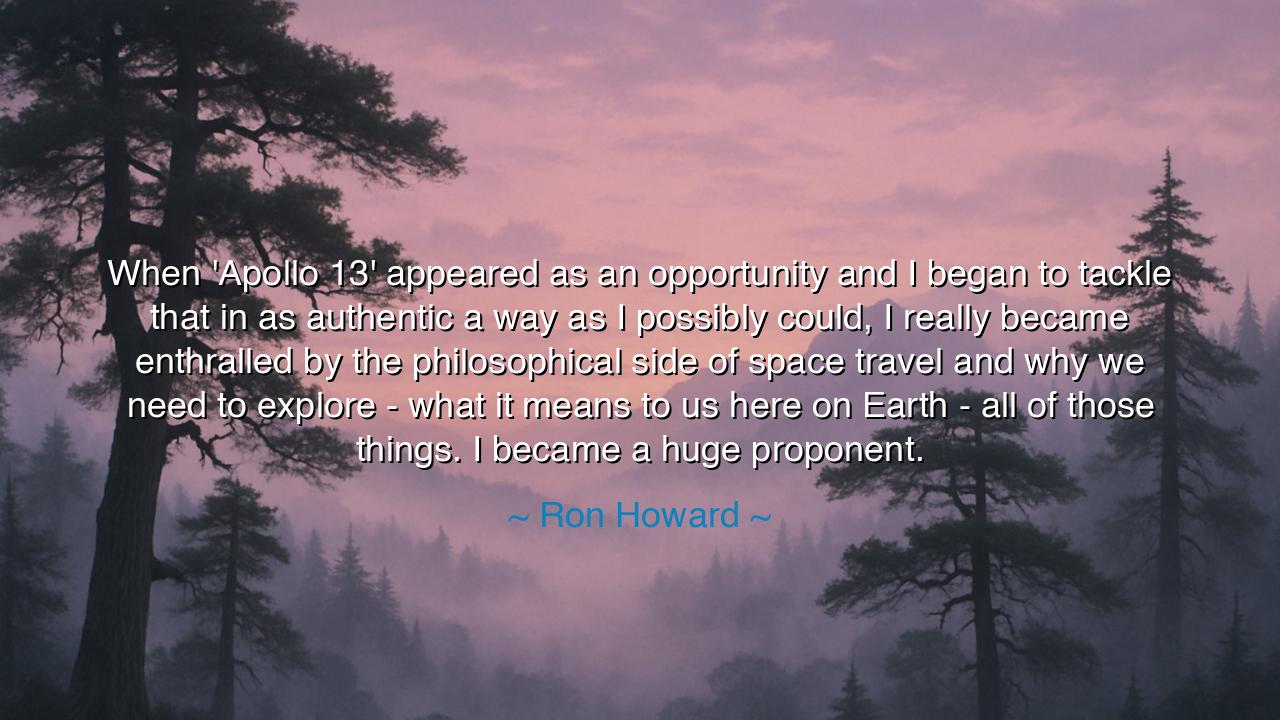
When 'Apollo 13' appeared as an opportunity and I began to tackle
When 'Apollo 13' appeared as an opportunity and I began to tackle that in as authentic a way as I possibly could, I really became enthralled by the philosophical side of space travel and why we need to explore - what it means to us here on Earth - all of those things. I became a huge proponent.






Listen closely to the words of Ron Howard, a filmmaker who, through his work on Apollo 13, was drawn not only into the world of space travel but into the philosophical depths that it invokes: “When 'Apollo 13' appeared as an opportunity and I began to tackle that in as authentic a way as I possibly could, I really became enthralled by the philosophical side of space travel and why we need to explore - what it means to us here on Earth - all of those things. I became a huge proponent.” These words reflect a profound realization that transcends the technical achievements of space exploration and speaks to its deeper purpose—its role in shaping the human spirit and advancing our understanding of existence and purpose.
In ancient times, great thinkers such as Plato and Aristotle contemplated the meaning of human existence in relation to the cosmos. To them, the universe was not just a vast, mechanical system of stars and planets; it was a reflection of higher truths and universal principles. Their philosophy was intertwined with the belief that the exploration of the heavens, whether through the study of the natural world or the journey of the soul, could reveal deeper truths about humanity’s place in the universe. In the same way, Howard’s reflections on space travel embody this ancient spirit of inquiry, for it is not just the conquering of the physical frontier that matters, but the knowledge and wisdom we gain from it.
Consider the story of Christopher Columbus, who set sail in search of new lands, driven not only by a desire for wealth but by an insatiable curiosity to uncover what lay beyond the horizon. In his time, the world was believed to be much smaller, yet the idea of reaching for the unknown, of challenging established limits, was a beacon for the explorers of the age. When Columbus first set foot on the New World, he did not just expand the map of the Earth—he expanded the boundaries of what humanity thought was possible. His exploration opened up the world to a new vision, just as space travel today expands the vision of who we are and what we might become.
Ron Howard’s journey into the philosophical side of space travel through Apollo 13 mirrors this same spirit. In telling the story of a crew stranded in space, fighting for survival, he not only captured the physical drama of their struggle but also the existential questions it posed. What is the meaning of human life when we are faced with the vastness of space, when we are so far from home, and when the fragility of our existence becomes so apparent? In the cold expanse of the universe, each person on Earth becomes part of a larger story, a story of human resilience, discovery, and the relentless pursuit of knowledge. For Howard, the journey to tell that story was not just about recreating events—it was about engaging with the deeper philosophical questions that space exploration poses to humanity.
The lesson that Howard imparts is one of purpose—the idea that space exploration is not merely an endeavor of technology and advancement but an exploration of humanity itself. Just as the ancient Greeks believed that understanding the cosmos was the path to understanding the self, so too does space travel challenge us to question our place in the world. Apollo 13 serves as a powerful reminder that the exploration of the unknown is not a mere outward journey but an inward one. It asks us to reflect on the courage, ingenuity, and unity required to overcome adversity. In the story of space exploration, we see not only the triumph of human spirit but the reflection of humanity’s deepest aspirations and values.
Through space travel, we confront our own limitations and yet push beyond them, just as the greatest minds of the past dared to challenge the constraints of their time. The space race, from its early days to the present, represents more than technological advancement; it symbolizes the indomitable human will to explore the unknown—to seek knowledge, to test the boundaries of what is possible, and to reflect upon what it means to be human in a vast and mysterious universe. As Howard came to realize, this exploration is as much about personal growth as it is about scientific discovery.
So, I urge you, dear listener, to consider the deeper meaning behind our pursuit of space. Just as Howard became a proponent of space exploration, we too must embrace the broader philosophical questions it raises. We are not merely voyaging into the stars; we are voyaging into the depths of our own souls. The greatest journeys are not only measured in distance or technological feats but in the transformations they bring about within ourselves. Just as Columbus did not simply discover new lands but opened the door to new understandings, so too can we embrace the challenges of exploration—not only for what we find in the cosmos but for what we find within ourselves.






AAdministratorAdministrator
Welcome, honored guests. Please leave a comment, we will respond soon